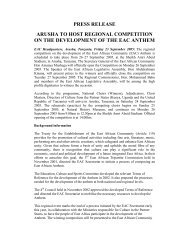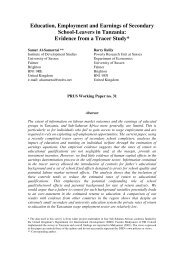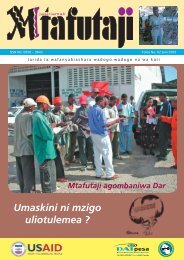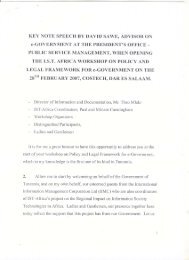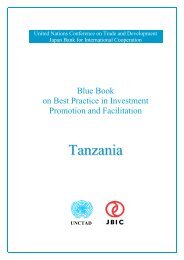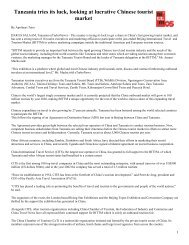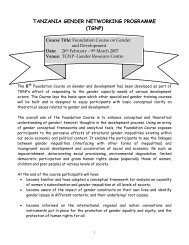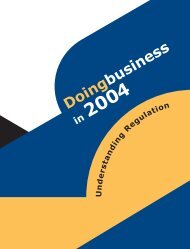Designing e-Government for the Poor - Tanzania Development ...
Designing e-Government for the Poor - Tanzania Development ...
Designing e-Government for the Poor - Tanzania Development ...
Create successful ePaper yourself
Turn your PDF publications into a flip-book with our unique Google optimized e-Paper software.
40<br />
Conducive policy environment <strong>for</strong> e-government<br />
was whe<strong>the</strong>r it was possible to conduct <strong>the</strong>se assessment methods as a<br />
more simplified process, and at a lower cost. Mr. Gunawardena explained<br />
that it is important to conduct all steps in <strong>the</strong> assessment method, and<br />
added that <strong>the</strong> entire assessment approach, including all surveys and focus<br />
groups, is not costly in terms of manpower.<br />
K. Conducive policy environment <strong>for</strong> e-government<br />
Mr. Peter Chong, Corporate Attorney, Microsoft<br />
In his presentation, Mr. Chong discussed conducive public policies<br />
<strong>for</strong> ICT/e-government from a macro perspective. He noted that poor communities<br />
are most disadvantaged by <strong>the</strong> lack of access to ICT. There<strong>for</strong>e,<br />
<strong>the</strong>re is a need to discuss and introduce policies that enhance <strong>the</strong> distribution<br />
of ICT, especially among <strong>the</strong> poor. Mr. Chong outlined <strong>the</strong> key<br />
challenges <strong>for</strong> expansion of ICT, which were:<br />
• Accelerating broadband deployment<br />
• Increasing research and development investment<br />
• Embracing “any time, anywhere” learning<br />
• Developing a world-class digital work<strong>for</strong>ce<br />
• Updating legal and regulatory systems<br />
• Political will<br />
Mr. Chong explained that <strong>the</strong> following policies are conducive to <strong>the</strong><br />
development and deployment of ICT:<br />
• Market liberalization - allow multiple ICT suppliers to enter <strong>the</strong><br />
market<br />
• Pro-competitive regulatory framework<br />
• Policies that make online environment secure<br />
• Policies that upgrade human skills through training<br />
Market liberalization entails moving away from state monopolies and<br />
lifting restrictions on <strong>for</strong>eign investment and ownership of licenses to allow<br />
multiple telecom service providers to apply <strong>for</strong> licenses based on merit. It<br />
requires deregulation in order to promote competition, lower costs, and<br />
improve quality of service. Market liberalization should include <strong>the</strong> following:<br />
• Market access <strong>for</strong> telecom service suppliers<br />
• Deregulation - particularly in telecoms<br />
• Liberalize fixed line and mobile sectors<br />
• Allocate spectrum <strong>for</strong> wireless broadband devices



